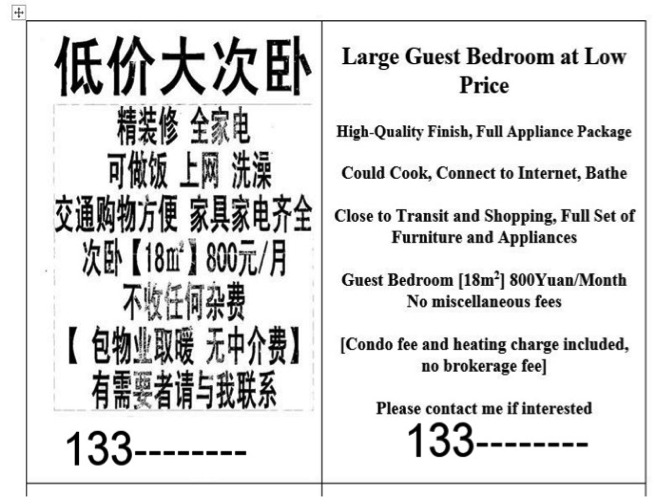Informal Subdivision of Apartments in China
+ Alain Bertaud
Chinese cities have very few identifiable informal settlements. However, the housing consumption of low-income households is often difficult to measure. Many of the new apartments built in Chinese cities periphery are too large to be affordable to low-income households. As a result, they are only able to afford housing by renting a room in a subdivided apartment.
The street poster appearing in 2013 in a Northern suburb of Beijing (Figure 1) advertise an 18 square meters room to be rented within a larger apartment with a kitchen and bathroom to be shared by other tenants. Fortunately, the city’s regulations tolerate this practice, although owners of apartments in condominiums where such subdivisions are common periodically protest the practice in an effort to convince the municipality to ban it.
From a housing supply point of view, this adjustment of standards, between what is built and what is affordable, is very desirable. Once a block of apartment has been built it is not possible to change the size of units to adjust it to the demand for smaller units. Informal subdivision of existing apartment is the faster way to match supply and demand. This situation need not to become permanent. As soon as new shousing supply is matched to demand, the practice of subdividing apartments will disappear by itself.

Government should not ban the practice of subdividing apartments but should monitor it carefully. Subdividing apartments is a second best solution. A number of regulations, in particular those setting arbitrarily minimum apartment size, or establishing maximum number of dwelling per block, might be responsible for the mismatch between supply and demand. Removing these regulations, which have no discernable benefits, would allow the market to respond to consumer demand reflecting the changing demography of a city.
This is an excerpt from Alain Bertaud's forthcoming working paper titled "Affordability: Household Income, Regulation, and Land Supply."

